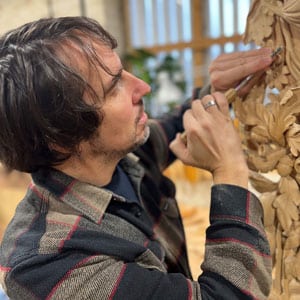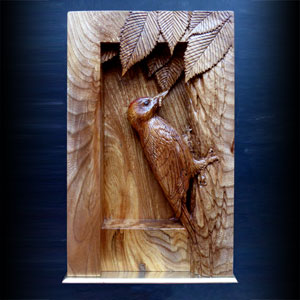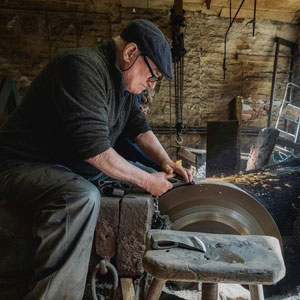 Woodcarver Tom Ball has won the second annual Woodworker of the Year Award sponsored by Axminster Tools, including a £2,000 prize and trophy awarded at a special presentation at St George’s College, Windsor Castle on Wednesday 15 November 2023.
Woodcarver Tom Ball has won the second annual Woodworker of the Year Award sponsored by Axminster Tools, including a £2,000 prize and trophy awarded at a special presentation at St George’s College, Windsor Castle on Wednesday 15 November 2023.
 Heritage Crafts was set up 13 years ago as a national charity to support and safeguard heritage crafts skills, and has become well known for its Red List of Endangered Crafts, the first research of its kind to rank traditional crafts in the UK by the likelihood they would survive the next generation.
Heritage Crafts was set up 13 years ago as a national charity to support and safeguard heritage crafts skills, and has become well known for its Red List of Endangered Crafts, the first research of its kind to rank traditional crafts in the UK by the likelihood they would survive the next generation.
Now in its second year, this award sponsored by Axminster Tools celebrates a heritage craftsperson who has made an outstanding contribution to the field of woodworking over the past year. It recognises a contribution that is far beyond the ordinary, based on a proven dedication to a particular woodworking skill.

Woodworker of the Year Award carved by 2022 finalist David Robinson
Tom Ball is the de Laszlo Lead Woodcarving Tutor at City & Guilds of London Arts School, and in 2021 was awarded the Master Carver Certificate by the Worshipful Company of Joiners and Ceilers. Recent projects include restoration of Grinling Gibbons’ carving at Trinity College Chapel, Oxford, and carving the canopy columns for Queen Elizabeth’s Platinum Jubilee.
Global suppliers of woodworking tools and machinery, Axminster Tools has spent 50 years building their family business into the renowned organisation it is today. Working together with makers and creators at all levels, from trade professionals through to craft enthusiasts, their commitment to supporting woodworking skills fits perfectly with the ethos of Heritage Crafts.
Judges for the new award were Alan Styles (Managing Director of Axminster Tools), Sarah Goss (a traditional woodcarver who featured as one of the experts in the recent Prince’s Master Crafters: The Next Generation programme on Sky Arts), and Jonathan Hill (luthier and Woodworker of the Year 2022).
The three other finalists for the 2023 award were marionette maker Oliver Hymans, woodcarver Yichen Li and furniture maker Andrew Watt. Read more about Oliver, Yichen and Andrew here.
 Heritage Crafts and The Royal Mint have announced the finalists of the inaugural Precious Metalworker of the Year award, including a silversmith, a silver spinner and a watch dial enameller.
Heritage Crafts and The Royal Mint have announced the finalists of the inaugural Precious Metalworker of the Year award, including a silversmith, a silver spinner and a watch dial enameller.
This new award celebrates a heritage craftsperson who has made an outstanding contribution to the field of precious metalworking over the past year. It recognises a contribution that is far beyond the ordinary, based on a proven dedication to a precious metalworking skill.
 The three finalists for this year’s award are (in alphabetical order):
The three finalists for this year’s award are (in alphabetical order):
- Rauni Higson – Rauni’s silversmithing commissions include the Goldsmith’s Cup for HMS Prince of Wales, a wedding gift for the Duke and Duchess of Cambridge, and the processional cross for Liverpool Metropolitan Cathedral. She currently has her first solo exhibition at The Makers Guild Wales, titled ‘Illuminating Silver’, supported by the Arts Council of Wales.
- Warren Martin – Warren is one of the few remaining silver spinners in Sheffield, a craft that has been listed as critically endangered. He spins for a number of silverware companies and designer makers. He has spun trophies for top flight sporting competitions including football, Formula 1 and horse racing, including the Champion Stakes at Ascot.
- Sally Morrison – Sally is a graduate of the Edinburgh College of Arts jewellery course and specialises in engraving and enamelling watch dials at the watch company anOrdain. Her interest in champleé enamelling, the art of applying translucent enamel over a usually textured and precious metal background, has made her the best of a very small and elite group of craftspeople.
The winner will be announced on Wednesday 15 November at a Winners’ Reception at Vicars’ Hall, St George’s House, Windsor Castle. A Young Metalworker of the Year will be announced at the same time.
Heritage Crafts is the national charity set up to celebrate and safeguard traditional craft skills as a fundamental part of the UK’s living heritage. It launched its partnership with The Royal Mint earlier this year, announcing four bursaries at an event held at the House of Lords. Since then, five bursaries have been awarded to those wanting to train or further develop skills in precious metals, along with expert support from the team at The Royal Mint. As an exemplar of British craftsmanship, The Royal Mint is committed to protecting and celebrating craftspeople and developing skills wherever possible.
The winner will be selected by a panel of judges made up of renowned advocates of craft skills:
- Paul Morgan, Head of Coin Design at The Royal Mint;
- Dr Rebecca Struthers, watchmaker and author of Hands of Time;
- Leighton John, Head of Operations at The Royal Mint.
Photo of Rauni Higson by Rebecca Oldfield.
About The Royal Mint
The Royal Mint’s expertise in precious metals spans over a thousand years. Known as the home of precious metals in the UK, The Royal Mint offers products including gold, silver and platinum commemorative coins, bars for investment, and a digital gold saving option, backed by metal held in their vault.
As part of their commitment to sustainability, last year they announced plans to build a factory to recover precious metals from electronic waste, currently active at lab level. Recovered metal is being used to create beautiful jewellery pieces in their latest business venture, 886 by The Royal Mint.
www.royalmint.com
 Heritage Crafts and Axminster Tools have announced the finalists of the second annual Woodworker of the Year award, including two woodcarvers, a furniture maker and a marionette maker.
Heritage Crafts and Axminster Tools have announced the finalists of the second annual Woodworker of the Year award, including two woodcarvers, a furniture maker and a marionette maker.
This award celebrates a heritage craftsperson who has made an outstanding contribution to the field of woodworking over the past year. It recognises a contribution that is far beyond the ordinary, based on a proven dedication to a particular woodworking skill.
 The four finalists for this year’s award are (in alphabetical order):
The four finalists for this year’s award are (in alphabetical order):
- Thomas Ball – Tom is the de Laszlo Lead Woodcarving Tutor at City & Guilds of London Arts School, and in 2021 was awarded the Master Carver Certificate by the Worshipful Company Of Joiners and Ceilers. Recent projects include restoration of Grinling Gibbons’ carving at Trinity College Chapel, Oxford, and carving the canopy columns for Queen Elizabeth’s Platinum Jubilee.
- Oliver Hymans – Oliver is an award-winning puppetry artist who has worked across four continents, designing and making puppetry for theatre, opera, film and music video. In 2023 he worked tirelessly to bring the puppetry sector together to get marionette making listed on Heritage Crafts’ Red List of Endangered Crafts to ensure the craft gets passed on to the next generation.
- Yichen Li – Yichen gathers aged carved wooden panels, which have hundreds of years of history, from the remnants of demolished ancient architecture. She meticulously restores, grinds, polishes, and colors them before combining them with contemporary wood carving techniques to form new spatial and architectural forms. In 2023 she completed her Masters degree at the Royal College of Art as a scholarship recipient.
- Andrew Watt – Andrew has worked with Method Studio for over six years, and in that time has risen to the position of lead cabinetmaker, running the workshop, making their most important pieces and inventing their way out of complex problems. He has developed and crafted stunning works for the likes of The Glenturret, Burberry, The Macallan, and Vacheron Constantin.
The winner will be announced on Wednesday 15 November at a Winners’ Reception at Vicars’ Hall, St George’s House, Windsor Castle. A Young Woodworker of the Year will be announced at the same time.
Heritage Crafts is the national charity set up to celebrate and safeguard traditional craft skills as a fundamental part of the UK’s living heritage. It launched its partnership with Axminster Tools last year, when luthier Jonathan Hill won the inaugural Woodworker of the Year Award. The company has spent 50 years building its family business into the renowned organisation it is today. They work with makers and creators at all levels, from trade professionals through to craft enthusiasts, to support woodworking skills.
The winner will be selected by a panel of judges made up of renowned advocates of craft skills:
- Jonathan Hill – stringed instrument maker and 2022 Woodworker of the Year.
- Alan Styles – Managing Director of Axminster Tools.
- Sarah Goss – traditional woodcarver and expert on Sky Arts’ Prince’s Master Crafters.
Image of Andrew Watt by Shannon Tofts
About Axminster Tools
Axminster Tools has established itself globally as a trusted seller in the mail order tools and machinery industry. They offer a friendly and personal service to many thousands of customers ranging from trade professionals and businesses to amateur DIY and craft enthusiasts.
Axminster Tools is a family business run by industry professionals and passionate craftspeople. Their knowledge is accessible to all, via regular tutorial videos, live streams, project plans and woodworking tips that are completely free to access.
As a British retailer, Axminster Tools supports British design and quality. They work with a number of UK suppliers in celebration of the nation’s skills and craftsmanship. What’s more, they design and manufacture an increasing number of own branded products in their Devon-based engineering facility, including bringing manufacturing back from overseas in many cases.
www.axminstertools.com
Heritage Crafts is delighted to award 11 new bursaries for trainees from across the UK to learn heritage craft skills, supported by the City & Guilds Foundation, the Army Benevolent Fund, the Ashley Family Foundation, the Principality Building Society’s Future Generations Fund, the Arts Society, DCA Consulting and Kendrick Hobbs.
These follow previous bursaries supported by The Royal Mint and other partners, and are intended to support heritage crafts trainees who are unable to meet the cost of their training, as the UK continues to deal with the ongoing cost-of-living crisis.
 Hannah Girvan is a Devon-based early-career furniture maker and architectural joiner who works for Woodlab, making furniture from local wood that they kiln-dry on site. Their bursary will allow them to undertake a one-to-one apprenticeship there, alongside spending up to a week per month at fine furniture school Williams & Cleal. Their goal is to develop a skillset based on eco-forestry principles. They plan to teach and speak in support of an inclusive culture in heritage crafts, helping craftspeople of the future.
Hannah Girvan is a Devon-based early-career furniture maker and architectural joiner who works for Woodlab, making furniture from local wood that they kiln-dry on site. Their bursary will allow them to undertake a one-to-one apprenticeship there, alongside spending up to a week per month at fine furniture school Williams & Cleal. Their goal is to develop a skillset based on eco-forestry principles. They plan to teach and speak in support of an inclusive culture in heritage crafts, helping craftspeople of the future.
Leena Patel is an Edinburgh-based early-career jewellery maker. For the last two years she has attended weekly community-based jewellery-making sessions. Her bursary will allow her to complete a one-year foundation course to continue on her jewellery-making journey. The course would provide an in-depth knowledge into the skills required to become a jewellery maker and designer. Ultimately, she hopes to start a business, and to encourage a diverse range of people with different backgrounds and cultures to feel comfortable and able to consider jewellery making or other crafts as part of their future.
Roy Evans trained as a metalsmith in the Royal Electrical and Mechanical Engineers. After leaving the Army he got a job in IT but always wanted to return to his passion, and started making metal sculptures in his spare time before giving up the day job in June this year. His bursary will allow him to train with Michael Johnson at Newlyn Copperworks in Cornwall, a workshop with an international reputation in a number of coppersmithing techniques. He plans to go on to teach the craft to others.
Andy Fisher is an early-career leatherworker who served in the Army and Reserves for 22 years in the Royal Corps of Transport, Royal Logistic Corps and 21 SAS. He currently works part time as a training provider in construction skills but his passion lies in leatherworking, especially for vintage vehicle interiors. His bursary will allow him to attend three courses on leather restoration and repair, seat upholstery, and industrial sewing machine repair. As well as restoring vehicles and making leather products, he also intends to run short courses for veterans.
Gareth Roberts was introduced to the craft of bookbinding by Bound by Veterans (BBV), after serving in the British Army. BBV is a charity which supports wounded, injured and sick ex-service personnel using the restorative powers of manual bookbinding to assist rehabilitation and develop employment skills. His bursary will allow him to continue to train with BBV and at Cit Lit College, London, under experts Kate Rochester, Sue Doggett, Ina Baumeister and 2018 Heritage Crafts Trainer of the Year Kathy Abbott. He plans to pass on his craft, believing that every sector of society has the right to learn this age-old skill.
Ieuan Williamson is a Gwynedd-based slate roofer whose great, great grandfather was a ferryman bringing slate down the river Dwyryd from the Ffestiniog slate quarries. He wishes to expand his skills into timber framing in order to incorporate whole building construction into his projects and make his business more viable to support his young family. His bursary will allow him, and his apprentice Dwyryd to attend an intensive two-week residential timber framing course. In the future he would like to pass on his skills to other young people in this area through the Welsh language.
Barney Murray is a Denbighshire-based early-career drystone waller who took up the craft after deciding that he preferred being outdoors than studying at college. His bursary will allow him to undertake the extremely rigorous and notoriously challenging Drystone Walling Association’s Master Craftsman certification scheme, under the mentorship of master waller Andy Loudon. In the future he intends to take on an apprentice of his own, replicating his own training path.
Bodhi King, based in Pembrokeshire, took up blacksmithing after attending a private week-long course last year in mid Wales. After experiencing homelessness he has spent the last few years building a more financially stable life for him and his son. His bursary will allow him to undertake a number of specialised courses focusing on traditional and heritage blacksmithing. He intends to operate as an independent blacksmith, doing smaller local jobs whilst developing his skillset and portfolio to do larger heritage and architectural work.
Abby Gray, originally from rural Galloway and now based in Glasgow, participated in a trainee programme in the costume department of an independent feature film in 2021. She had no prior professional experience, but as a result realised that university wasn’t the right path for her and that she wanted to pursue a career in bespoke tailoring. Her bursary will allow her to undertake an apprenticeship with renowned tailor and dressmaker Alis Le May. In the future she would like to run her own business focusing on creating bespoke clothing for people who feel that they aren’t catered for.
Logan Beckford-China, aged 16, is based in Cornwall and passionate about supporting the critically endangered craft of Cornish hedging, having been introduced to the craft through Heritage Crafts’ Pre-apprenticeship Project earlier this year. Logan intends to undertake 40 days training under the auspices of the newly-formed Cornwall Rural Education and Skills Trust (CREST) while studying in the evenings for his GCSE in Environmental Management. He intends to work as a freelance Cornish hedger, the first of a new generation that will ensure the future of this centuries-old craft.
Cameron Wallace is a Clackmannanshire-based monumental mason in his first year of self-employment with a young family. Not content with computer-controlled sandblasting to inscribe memorials, Cameron wishes to join the small number of Scottish hand lettercutters. His bursary will allow him to learn with master lettercutter Gillian Forbes, and eventually set up his own workshop making beautiful hand-crafted memorials.
Heritage Crafts Endangered Director Daniel Carpenter said:
“Building on the five bursaries awarded earlier this year in partnership with The Royal Mint, we are immensely grateful to be working with so many wonderful partners to increase that number to sixteen in 2023. These bursaries will not only change the course of their recipients lives for the better, but will help ensure the future of so many skills that are rooted deep within the UK’s intangible cultural heritage.”
Click here to see the 22 bursaries awarded since 2021
Download press releases:
About Heritage Crafts
Founded in 2009, the Heritage Crafts is a Charitable Incorporated Organisation (CIO) registered as the ‘Heritage Crafts Association’. Working in partnership with government and key agencies, it provides a focus for craftspeople, groups, societies and guilds, as well as individuals who care about the loss of traditional crafts skills, and works towards a healthy and sustainable framework for the future. Its aim is to support and promote heritage crafts as a fundamental part of our living heritage.
www.heritagecrafts.org.uk
About the City & Guilds Foundation
The City & Guilds Foundation is part of the City & Guilds Group charity, and has a specific focus on high impact social investment, recognition and advocacy programmes. Each of the programmes it runs act as a catalyst to make a difference to people, organisations and society, through investing part of its surplus and resources into helping everyone, no matter who they are or where they come from, get opportunities to succeed.
cityandguildsfoundation.org
About the Army Benevolent Fund The Soldiers’ Charity
The Army Benevolent Fund is the Army’s national charity. It stands at the forefront of support for the Army family, last year supporting 70,000 people in 45 countries around the world. As one of the largest funders in the sector, it awards grants to individuals and families, and fund leading organisations that support soldiers, former soldiers, and their families.
soldierscharity.org
About the Ashley Family Foundation
The Ashley Family Foundation (formerly The Laura Ashley Foundation) is a registered charity founded by Sir Bernard and Laura Ashley following the success of the Laura Ashley fashion and interiors business. It uses its funding to develop strong communities, social welfare and creative arts in England and Wales, with a particular emphasis on supporting rural communities.
www.ashleyfamilyfoundation.org.uk
About the Principality Building Society’s Future Generations Fund
The Principality Building Society’s Future Generations Fund is a Wales-wide fund set up in partnership with Principality Building Society with the aim of having a positive impact on society and the lives of young people in Wales.
communityfoundationwales.org.uk/grants/the-principality-building-societys-future-generations-fund
About the Arts Society
The Arts Society is a leading arts education charity with a global network of local societies which bring people together through a shared curiosity for the arts. Its belief that the arts have the potential to enrich peoples’ lives is at the heart of everything it does.
theartssociety.org
About DCA Consulting
DCA is a Birmingham based culture, creativity and regeneration consultancy and project development company working on arts, creative industries, media, heritage, regeneration and broader economic development projects.
www.dca-consultants.com
About Kendrick Hobbs
Kendrick Hobbs delivers relevant, sympathetic and financially sustainable catering solutions, and is uniquely placed to advise how best to plan, setup, design, organise and manage catering operations in theatres, visitor attractions, historic houses, music halls, museums and galleries.
kendrickhobbs.co.uk
 The three finalists for the fourth President’s Award for Endangered Crafts, established by Heritage Crafts President The Former Prince of Wales, have been announced.
The three finalists for the fourth President’s Award for Endangered Crafts, established by Heritage Crafts President The Former Prince of Wales, have been announced.
Each year the President’s Award presents £3,000 to the winning heritage craftsperson who will use the funding to ensure that craft skills are passed on to the future, with an additional £1,000 for runner-up bursaries provided by Patricia Lovett MBE and Kate Hobhouse.
The three finalists for 2023 are (in alphabetical order):
The winner will be announced at a prestigious Winners’ Reception at the Vicar’s Hall, St George’s House, Windsor Castle on 15 November 2023.
The finalists were selected by a panel of judges made up of renowned advocates of craft skills:
- Jay Blades MBE, Co-Chair of Heritage Crafts;
- Kate Hobhouse, Chair of Fortnum and Mason;
- Patricia Lovett MBE, former Chair of Heritage Crafts;
- Simon Sadinsky, Executive Director of The Prince’s Foundation; and
- Johanna Welsh, pargeter and 2022 President’s Award winner.
 The family of the late master hand grinder Brian Alcock have received a posthumous British Empire Medal in the King’s Birthday Honours in recognition of his service to the Sheffield cutlery trade and heritage crafts.
The family of the late master hand grinder Brian Alcock have received a posthumous British Empire Medal in the King’s Birthday Honours in recognition of his service to the Sheffield cutlery trade and heritage crafts.
Brian, who passed away less than three weeks ago, was one of six makers nominated by Heritage Crafts to receive national honours, alongside clockmaker David Poole MBE, boatbuilder Ronald John Maclean MBE, blacksmithing trainer Delyth Done MBE, marbler and woodgrainer Robert Woodland MBE, and knitwear designer Jeanette Sloan BEM, in recognition of their unparalleled craftsmanship and tireless work in ensuring their skills are passed on to current and future generations.
The six were nominated for this year’s Birthday Honours, following 24 previously successful nominations from Heritage Crafts since 2013. In May, the charitable organisation – which was set up in 2009 to support and champion traditional craft skills – published the fourth edition of its groundbreaking Red List of Endangered Crafts, the only report of its kind to rank UK craft skills by the likelihood they will survive into the next generation.
Heritage Crafts was deeply saddened to learn of Brian Alcock BEM’s passing on 30 May. As a jobbing grinder working up to a week before his death, Brian was an unparalleled repository of knowledge and skill in the craft of hand grinding. He exemplified the honest work ethic of a skilled master craftsman, and even at the age of 81 he would work 40 hours a week, starting at 6.30am each morning through all four seasons. No job was too small for him; even putting an edge on a simple pocket knife was handled with the care and concentration of a man who relished the craft he had learnt so well.
What set Brian apart was how freely he shared his knowledge and skill. Five years ago founding Heritage Crafts Chair Robin Wood MBE was concerned that once Brian stopped he would have nobody to grind axes for his growing business, and that this important part of Sheffield’s cultural heritage could be lost. At this point Brian offered to train Robin’s apprentice Zak Wolstenholme. He had been passing his knowledge of how to grind tools and maintain the machinery to Zak, free of charge, right up until his passing. Zak admired him greatly and he had become a very significant life mentor.
Thankfully, Brian learned of his forthcoming honour before he died, knowing the esteem in which he was held. Our thoughts are with his family and friends at this time.
 David Poole MBE has been clock maker of the highest standard for over forty years. He has made critical contributions to horological education, establishing remote learning, support and examinations through the British Horological Institute and organising apprenticeships through the George Daniels Educational Trust. Between 2016 and 2019 David set up the Watchmakers Trailblazer Apprenticeship Scheme, one of the first of its kind under the government-backed initiative to promote craft apprenticeships, overcoming many obstacles with devotion and total service.
David Poole MBE has been clock maker of the highest standard for over forty years. He has made critical contributions to horological education, establishing remote learning, support and examinations through the British Horological Institute and organising apprenticeships through the George Daniels Educational Trust. Between 2016 and 2019 David set up the Watchmakers Trailblazer Apprenticeship Scheme, one of the first of its kind under the government-backed initiative to promote craft apprenticeships, overcoming many obstacles with devotion and total service.
Ronald John MacLean MBE represents an unbroken line of boat builders who, over 150 years, have provided as many as one thousand workboats to the island communities of the Hebrides. He has preserved an entire style of vernacular boat building (the Grimsay workboat of Scotland) through his craft skills, teaching and interpretation of the tradition. He has designed accredited courses in Traditional Boatbuilding Skills, and with his gifts as a teacher devised a curriculum to transmit the Grimsay boat tradition through Gaelic boatbuilding terminology.
Delyth Done MBE has been unparalleled throughout the past decade in ensuring that the next generation of blacksmiths have the high-level skills they need. As head of the blacksmithing degree programme at Hereford College of Arts for over ten years, she has been directly responsible for improving the training standards so that graduates are recognised and sought after as employees by master blacksmiths around the world.
Robert Woodland MBE is one of the most highly-skilled ornamental artists, woodgrainers and marblers in the UK today. His work can be seen in a variety of buildings across the country, including the Palace of Westminster, Buckingham Palace, the British Museum, the Tower of London, Grand Lodge, Harrods, Harvey Nichols, Kensington Palace, Bagshot Park and the Mandarin Hotel. Robert has a passion to keep his trade alive and shares his knowledge openly with students from around the world, enthusiastically demonstrating his craft whenever he has a chance.
Jeanette Sloan BEM is one of the most prominent and successful Black knitwear designers in the UK today, and has done a huge amount to promote and celebrate the contribution of Black, Indigenous and People of Colour (BIPOC) to British textile crafts. Among a career of achievements, she devoted her time and expertise, unpaid, to found the ‘BIPOC in Fibre’ project, to celebrate and raise awareness of the contribution of BIPOC to British textile design.
Heritage Crafts Executive Director Daniel Carpenter said:
“We are thrilled that six of our nominations have been recognised in this the first Birthday Honours of King Charles III’s reign. Having traditional craftspeople up there with other great luminaries of public life in this way is vitally important, as UK is still one of only 12 of the 193 UNESCO member states yet to ratify the 2003 Convention on the Safeguarding of Intangible Heritage.”
Heritage Crafts encourages anyone who supports the continuation of traditional craft skills, whether or not they are makers themselves, to become Heritage Crafts members via its website www.heritagecrafts.org.uk.
The charity has set up an Endangered Crafts Fund to provide small grants to projects that increase the likelihood of endangered craft skills surviving into the next generation, and is currently seeking donations to save more of Britain’s most endangered crafts from oblivion – visit www.heritagecrafts.org.uk/ecf to find out more and to donate
 Woodcarver Tom Ball has won the second annual Woodworker of the Year Award sponsored by Axminster Tools, including a £2,000 prize and trophy awarded at a special presentation at St George’s College, Windsor Castle on Wednesday 15 November 2023.
Woodcarver Tom Ball has won the second annual Woodworker of the Year Award sponsored by Axminster Tools, including a £2,000 prize and trophy awarded at a special presentation at St George’s College, Windsor Castle on Wednesday 15 November 2023. Heritage Crafts was set up 13 years ago as a national charity to support and safeguard heritage crafts skills, and has become well known for its Red List of Endangered Crafts, the first research of its kind to rank traditional crafts in the UK by the likelihood they would survive the next generation.
Heritage Crafts was set up 13 years ago as a national charity to support and safeguard heritage crafts skills, and has become well known for its Red List of Endangered Crafts, the first research of its kind to rank traditional crafts in the UK by the likelihood they would survive the next generation.


 Heritage Crafts and The Royal Mint have announced the finalists of the inaugural Precious Metalworker of the Year award, including a silversmith, a silver spinner and a watch dial enameller.
Heritage Crafts and The Royal Mint have announced the finalists of the inaugural Precious Metalworker of the Year award, including a silversmith, a silver spinner and a watch dial enameller. The three finalists for this year’s award are (in alphabetical order):
The three finalists for this year’s award are (in alphabetical order):


 Heritage Crafts and Axminster Tools have announced the finalists of the second annual Woodworker of the Year award, including two woodcarvers, a furniture maker and a marionette maker.
Heritage Crafts and Axminster Tools have announced the finalists of the second annual Woodworker of the Year award, including two woodcarvers, a furniture maker and a marionette maker. The four finalists for this year’s award are (in alphabetical order):
The four finalists for this year’s award are (in alphabetical order):


 Hannah Girvan is a Devon-based early-career furniture maker and architectural joiner who works for Woodlab, making furniture from local wood that they kiln-dry on site. Their bursary will allow them to undertake a one-to-one apprenticeship there, alongside spending up to a week per month at fine furniture school Williams & Cleal. Their goal is to develop a skillset based on eco-forestry principles. They plan to teach and speak in support of an inclusive culture in heritage crafts, helping craftspeople of the future.
Hannah Girvan is a Devon-based early-career furniture maker and architectural joiner who works for Woodlab, making furniture from local wood that they kiln-dry on site. Their bursary will allow them to undertake a one-to-one apprenticeship there, alongside spending up to a week per month at fine furniture school Williams & Cleal. Their goal is to develop a skillset based on eco-forestry principles. They plan to teach and speak in support of an inclusive culture in heritage crafts, helping craftspeople of the future. The three finalists for the fourth President’s Award for Endangered Crafts, established by Heritage Crafts President The Former Prince of Wales, have been announced.
The three finalists for the fourth President’s Award for Endangered Crafts, established by Heritage Crafts President The Former Prince of Wales, have been announced. 




 The family of the late master hand grinder Brian Alcock have received a posthumous British Empire Medal in the King’s Birthday Honours in recognition of his service to the Sheffield cutlery trade and heritage crafts.
The family of the late master hand grinder Brian Alcock have received a posthumous British Empire Medal in the King’s Birthday Honours in recognition of his service to the Sheffield cutlery trade and heritage crafts. David Poole MBE has been clock maker of the highest standard for over forty years. He has made critical contributions to horological education, establishing remote learning, support and examinations through the British Horological Institute and organising apprenticeships through the George Daniels Educational Trust. Between 2016 and 2019 David set up the Watchmakers Trailblazer Apprenticeship Scheme, one of the first of its kind under the government-backed initiative to promote craft apprenticeships, overcoming many obstacles with devotion and total service.
David Poole MBE has been clock maker of the highest standard for over forty years. He has made critical contributions to horological education, establishing remote learning, support and examinations through the British Horological Institute and organising apprenticeships through the George Daniels Educational Trust. Between 2016 and 2019 David set up the Watchmakers Trailblazer Apprenticeship Scheme, one of the first of its kind under the government-backed initiative to promote craft apprenticeships, overcoming many obstacles with devotion and total service.
